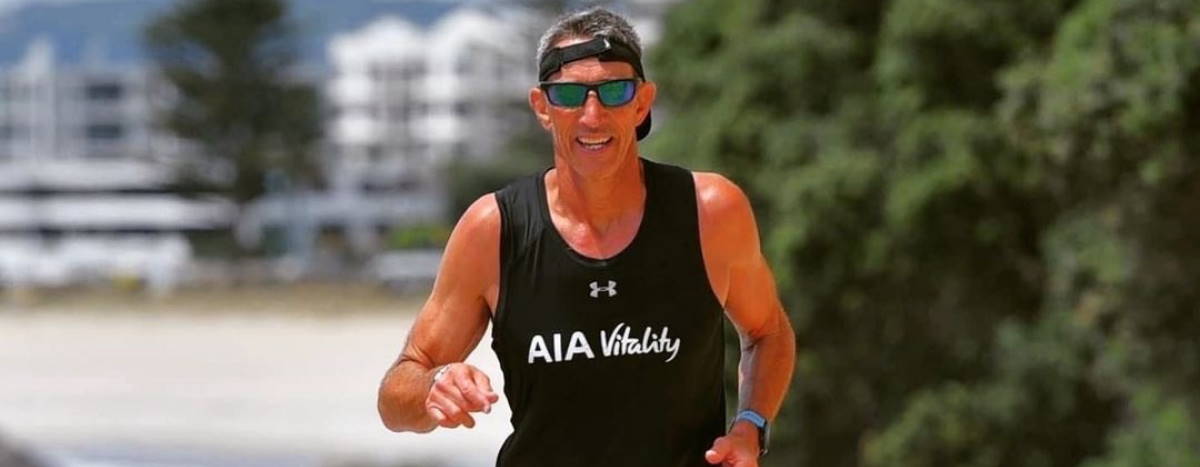Life Insurance
Lump sum payment if you were to pass away or are diagnosed with a terminal illness.
AIA Vitality NZ - 4 min read
05 November 2021
It can be difficult to get moving when your usual support systems aren’t available. AIA Vitality Ambassador Ian Jones shares some tips and tricks on his approach to training, and how to motivate yourself when things aren’t going to plan.

"After my professional rugby career, I thought I could go back to a normal life. But I didn’t know what normal was. I missed the competitive side of rugby I shared with my teammates, and I wanted to fill that void. That’s when I discovered my new passion for endurance events. I wanted to have a clear goal, a structured routine and like-minded people to train with."
My first Ironman event was in 2017. It’s a life-changing event – a huge challenge consisting of a 4km swim, a 180km bicycle ride and a marathon to cap it all off. I still remember that nervous buzz I had on the start line.
Crossing the finish line is a feeling like no other. It’s such an emotional place to be at the end of the event, celebrating with all the other athletes who’ve gone through that same challenge. It gives me goosebumps just thinking about it.
While preparing for the event, I found my fellow training partners incredibly important – they keep you grounded, they share in your ups and downs, and training time seems to fly when you’re having fun. Preparing with like-minded people who share the same goals can really boost your motivation.
However, COVID-19 lockdown meant that I couldn’t access my usual support network, which meant I had to get creative with how I stayed motivated.
Lockdown meant that I couldn’t meet up with my usual training partners. Instead, I’d write down a training plan on a Sunday, so I have a clear, structured plan for the week ahead. I like to physically tick those off after I’ve completed them – it’s a very satisfying feeling.
Other than being a highlight in my day, ticking these workouts off is a nice, tangible way to keep track of my sessions, which I can share with my training mates over a call at the end of the week.
While under lockdown, we used Zwift, an online cycling platform. You can ride ‘together’, share your workouts and have a chat to see how everyone is doing. Finding time to connect – even over a virtual workout – was important in keeping ourselves honest and accountable with our training schedules.
As I’m getting older (and a little smarter), I’m finding my Garmin smartwatch an amazing companion in my training sessions (plus, AIA Vitality users get a discount on Garmin – and other – wearables). I currently use the watch to pace my runs based on my heart rate, ensuring I’m running at a sustainable speed to avoid injury or fatigue. I haven’t done this in the past, and it’s been a great help to me.
It’s easy to look at the Ironman event and think, ‘Far out – what a huge day. This is going to be overwhelming to train for’. It is, but I like to break my training down into little stages, which I think is an excellent solution to approaching big events.
For example, I’d plan a bike ride on Monday, run on Tuesday, and a swim on Wednesday. I’d include these on my plan on Sunday, and I cross them out when I finish them. When working with these smaller goals, I feel like I’ve got my direction set for the week. I prioritise training in my life, so structuring my schedule gives me a clear outlook for the week and a path of small steps to follow to my ultimate goal.
When you accomplish your goal, don’t forget to celebrate. Don’t simply say, ‘Well, that was cool’ and move on to the next one. Whether you’ve ticked off a run, finished a marathon or simply completed your weekly training plan – take some time out to celebrate what you did. You should be proud of what you just achieved – it’s a feeling like no other.
The Ironman event is what I consider to be an ‘epic challenge’. I love epic challenges, and I love to do things that are really going to test me, like the Great Barrier 100km Challenge swimming event I completed earlier this year.
That being said, don’t compare my epic challenge with your own. Whatever your challenge is, it’s the right one. You could be running your first five kilometres or walking a half marathon. That’s a huge achievement for lots of people, and we should never underestimate how hard it is to make that dream come true. I feel so proud whenever I see people set a goal and work hard to achieve it.